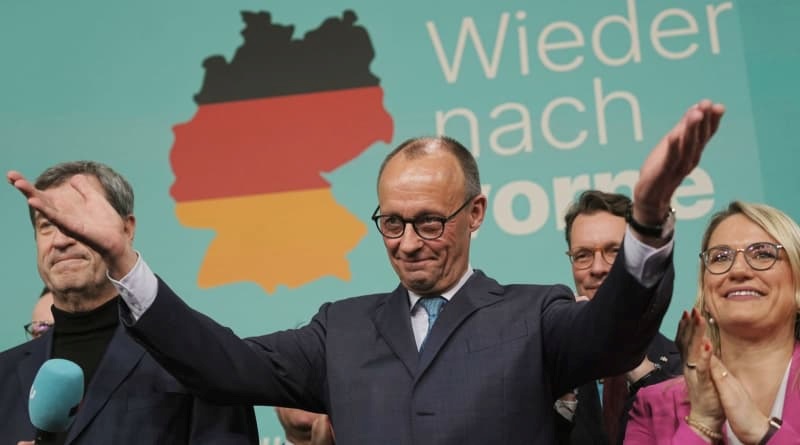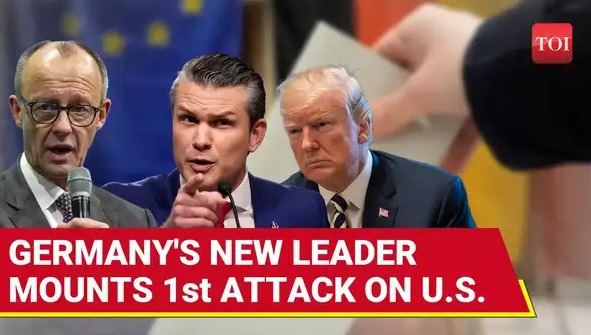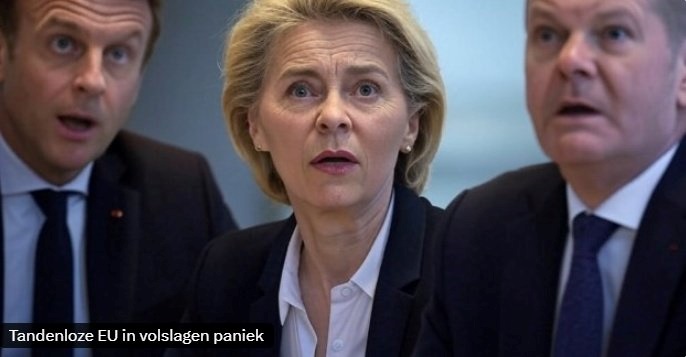 Friedrich Merz, Chairman and candidate for chancellor of the Christian Democratic Union (CDU), at the party's headquarters after his victory forecast of the German federal election for the 21st Bundestag.
Friedrich Merz, Chairman and candidate for chancellor of the Christian Democratic Union (CDU), at the party's headquarters after his victory forecast of the German federal election for the 21st Bundestag.
Photo: DPA
After winning the German election, the conservative leader Friedrich Merz must navigate a new era without Washington as a close ally, POLITICO stresses.
Never in history has a German head of government had more affinity for the United States. Merz has traveled to the U.S. over 100 times, by his own tally, and counts former U.S. President Ronald Reagan as one of his role models.
Merz, whose conservative alliance have won Sunday’s national election with 29 percent of the vote, according to early official projections, is particularly fond of one Reagan quip that summarizes the German leader’s American-style skepticism of state intervention: “The nine most terrifying words in the English language are: ‘I’m from the government, and I’m here to help.’”
But just as Merz is on the cusp of taking power in Germany, his cherished America has turned from indispensable friend to frenemy. Merz and other European mainstream leaders increasingly see the U.S. no longer a beacon — that “shining city upon a hill,” as Reagan liked to call it — but rather as another force joining Russia and China to steadily chip away at their ever-more brittle democracies.
“This is really now the change of an era,” Merz said on stage at the Munich Security Conference earlier this month after U.S. Vice President JD Vance gave a speech that cast Europe’s centrist parties — not Russia or China — as the greatest threat to European security. “If we don’t hear the wake-up call now,” Merz added, “it might be too late for the entire European Union.”
For Merz, an avowed transatlanticist, there could hardly be a ruder awakening. The question that will define his tenure will be whether he can lead Germany and Europe in defending the fraying liberal order without the U.S. — or whether, as Merz suggested in Munich, it’s already almost too late.
This wasn’t how Merz had imagined his long-sought moment of victory...
Merz became a conservative member of the European Parliament in 1989, the year the Berlin Wall fell. Five years later he was elected to the German Bundestag, where he developed a close relationship with Wolfgang Schäuble, the CDU stalwart and forceful advocate of European Union integration. Under Schäuble’s tutelage, Merz rose in stature and was considered a likely choice for chancellor candidate.
His rise ended in 2002, however, when he lost a power struggle with the more centrist Angela Merkel.
Over a decade in the private sector, Merz sat on a series of corporate boards, including a four-year stint with U.S. asset manager BlackRock, a time he counts as among the happiest in his life, according to biographer Resing. Merz says this time provided him valuable experience outside of politics, but his critics accuse him of simply using his political connections to lobby for powerful interests, making himself a millionaire in the process.
When Merkel stepped down as CDU leader in 2018, Merz saw an opportunity to return to politics.
Though Merz and his conservatives emerged victorious in Sunday’s election, surveys suggest he’s not particularly popular among the public.
In a country that remains deeply skeptical of the financial industry, Merz’s wealth and time at BlackRock, the American investment company, are often viewed with suspicion. It doesn’t help matters that Merz routinely jets around the country in his own twin-engine plane, which he flies himself, having fulfilled a lifelong dream by getting his pilot’s license in his 50s.
“Friedrich Merz is not really very beloved, but he is respected,” Günther Oettinger, a former senior CDU politician and European commissioner, told POLITICO late last year.
Yet Merz also has a reputation for being impulsive, thin-skinned and prone to populist bluster, particularly when it comes to migration. His defenders say he’s merely a risk-taker — at trait he took from his years in the private sector — and someone who doesn’t shy away from sharp-tongued debate.
“The differences between the U.S. and Europe are taking on a whole new quality,” he wrote in a note to his supporters after Vance’s speech. “Now it is no longer ‘just’ about defense; now it is about our basic understanding of democracy and an open society.” …
In an interview Merz warned that Europe should prepare for Trump to end NATO protection and hinted at a major strategic shift, saying Germany needed to discuss the possibility of “nuclear sharing, or at least nuclear security” with European nuclear powers the United Kingdom and France. German conservatives have previously favored maintaining strong ties with the U.S. over calls from Paris to cultivate European “strategic autonomy.”
Merz’s rhetorical shift showed just how unnerved he now is by the Trump administration. The question is whether Germany’s next chancellor will succeed in taking the EU — itself confronting the rise of Russia-friendly, far-right parties — in a fundamentally new direction.

German election winner Friedrich Merz likens the Trump administration to Putin’s Russia as he bids to take Europe in a new direction, POLITICO notes.
The Trump administration does not care about Europe and is aligning with Russia, said Merz. The continent, he warned, must urgently strengthen its defenses and potentially even find a replacement for NATO — within months.
Merz's comments mark a historic watershed: They reveal how deeply Trump has shaken the political foundations of Europe, which has depended on American security guarantees since 1945.
If he follows through on his rhetoric after assembling a new government in the coming weeks, Merz will steer Europe in a radical new direction at a critical time for the security of Ukraine and the wider region.
“My absolute priority will be to strengthen Europe as quickly as possible so that, step by step, we can really achieve independence from the USA,” Germany's chancellor-in-waiting said. “I never thought I would have to say something like this on a television program. But after Donald Trump's statements last week at the latest, it is clear that the Americans, at least this part of the Americans, this administration, are largely indifferent to the fate of Europe.”
Merz, a staunch Atlanticist who has spent much of his professional career as a lawyer working with and for American firms, didn't stop there. Later this year, a NATO summit will be held — but he suggested Europe may need to devise a new defense structure to replace it.
“I am very curious to see how we are heading toward the NATO summit at the end of June," he said. "Whether we will still be talking about NATO in its current form or whether we will have to establish an independent European defense capability much more quickly."
Such extraordinary statements from the likely next leader of Europe’s biggest economy are stronger than any head of government has made in response to the U.S. president’s 10-day onslaught against Europe and Ukraine.
Merz suggested it was time to explore nuclear cooperation between France, the U.K. and Germany (and others) to replace the American nuclear umbrella that has guaranteed European safety from Russian attack. His speculation was anything but idle.
Merz's conservative alliance is projected to win the most seats in the Bundestag but will need to stitch together a coalition with at least one center-left party over the coming weeks.
But he has clearly decided already that he needs to take up the mantle of European leadership, which Germany has been unable to provide in recent months due largely to the election campaign and the political crisis that preceded it.
Merz even went as far as to liken the Trump administration's recent tactics to those of Russia. He was especially critical of tech billionaire Trump adviser Elon Musk for endorsing the far-right Alternative for Germany (AfD) party in the German election.
"I have absolutely no illusions about what is happening from America," Merz said during a televised debate on Sunday night. "Just look at the recent interventions in the German election campaign by Mr. Elon Musk — that is a unique event. The interventions from Washington were no less dramatic and drastic and ultimately outrageous than the interventions we have seen from Moscow. We are under such massive pressure from two sides that my absolute priority now really is to create unity in Europe."
Merz said he had some "residual" hope that the U.S. Congress and the White House would not completely cut Ukraine out of any peace negotiations, though he did not sound optimistic. "I am not sure what the American government's position on this war will be in the coming weeks and months. My impression over the last few days is that Russia and America are coming together here, over the heads of Ukraine and therefore also over the heads of Europe," he said.
Earlier, Trump appeared to offer something of an opening to Merz, in a characteristically bizarre manner. The president congratulated the election winners, without naming Merz, and also claimed the conservative victory was part of his own success, somehow.

read more in our Telegram-channel https://t.me/The_International_Affairs

 10:32 25.02.2025 •
10:32 25.02.2025 •






















